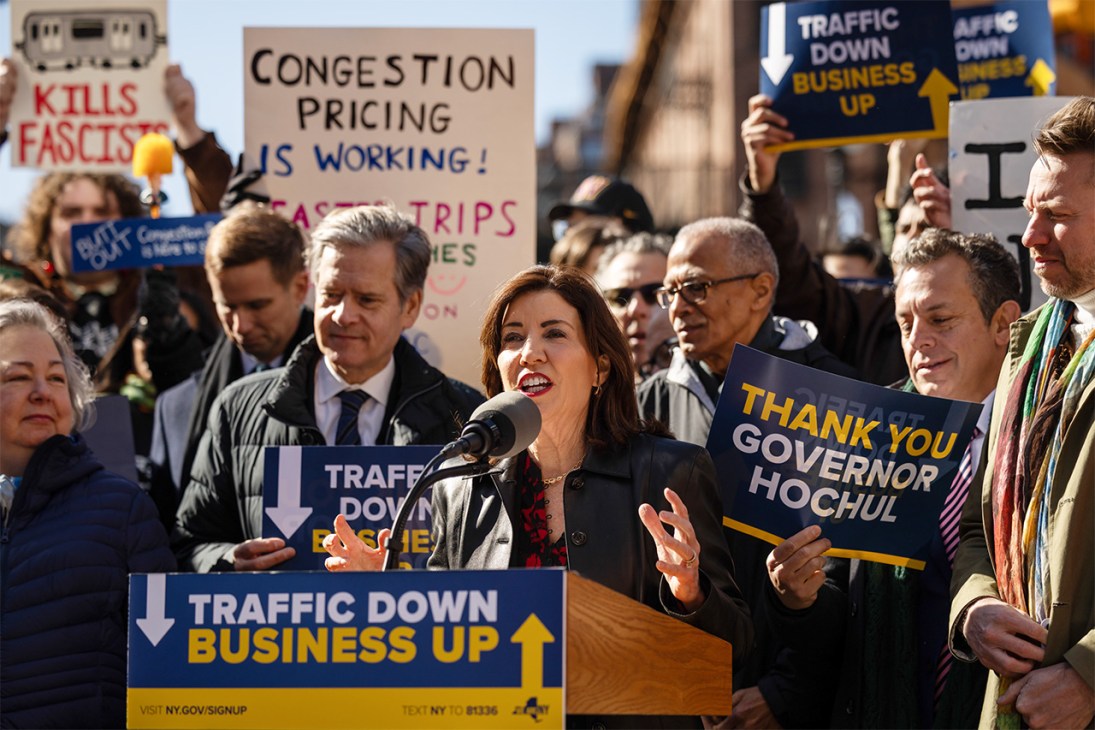There have been many calls for resistance against president Donald Trump since he returned to the White House in January – but surprisingly little action. New York, however, appears to be stepping up and taking the fight against executive overreach to the streets – literally.
Just weeks before Trump’s inauguration, New York introduced the most expansive congestion-pricing scheme in the nation. Under the plan, drivers travelling below 60th Street are now charged $9 (€8) during peak hours – 05.00 to 21.00 on weekdays and 09.00 to 21.00 on weekends – and $2.25 (€2) during off-peak hours for the “privilege” of driving below Midtown. Viewed as an eco-friendly, pedestrian-friendly and cyclist-friendly revenue-raiser, congestion pricing brought in a respectable $159m (€140m) in its first three months of operation, according to New York’s Metropolitan Transportation Authority (MTA) – well on its way to reaching the $500m (€440m) goal set for its first year. The money will go towards new subway infrastructure along with closing the MTA’s projected $3bn (€2.6bn) budget deficit.

First proposed back in 2019, congestion pricing has not been without controversy: a group of small-business owners filed a suit in February 2024 to halt its implementation over fears that it would hurt restaurant traffic. But backed by both New York’s state governor, Kathy Hochul, and New York City mayor (and avid cyclist), Eric Adams, the pricing plan commenced this year. And that’s when Trump stepped in.
Within weeks of his inauguration, the White House pulled the federal approval for New York’s pricing plan granted by the Biden administration back in May 2023. The move was not entirely surprising – in 2019, Trump held up federal approval amid fights with then-governor Andrew Cuomo over immigration reform. New York, it seems, needs White House support for the scheme because it includes highways that receive federal funding.
Five years on, Trump has returned to Washington and congestion pricing has emerged as a high-profile power struggle between frustrated big-city progressives and a regressive (and repressive) White House. The latest flare-up played out this past week when New York ignored a third White House deadline to end congestion pricing — with little to suggest that it will pause the programme anytime soon. The White House, however, appears to have had enough, with secretary of transportation, Sean Duffy, threatening to freeze federal funding for Manhattan transport projects as early as 28 May if the scheme is not paused.

Hochul, for her part, appears unmoved. “Congestion pricing is lawful – and it’s effective. Traffic is down, business is up and the cameras are staying on,” her spokesperson said last week. The numbers are clearly on Hochul’s side: since congestion pricing began, New York has seen two million fewer car trips per month, according to the MTA, while public transport ridership is up. Most crucially, according to Hochul’s office, rather than businesses such as restaurants and theatres seeing declines in the “congestion” zones – they have actually seen an increase in reservations and sales.
Despite the gripe with Trump, other US cities are taking note of New York’s congestion-pricing wins as they weigh up the implementation of their own traffic tolls. San Francisco, in particular, could take the plunge as it faces major budget shortfalls for its beleaguered public-transport system, which has yet to fully recover from pandemic-era declines.
In the meantime, all eyes will be on Manhattan this coming week as it faces the first real test of its White House defiance. Without federal support, New York’s already ailing subways will fall into further decline. But this time, rather than blaming Covid, New Yorkers – who overwhelmingly support congestion pricing – will have a more tangible target for their ire: one Donald J Trump.
Kaufman is an editor and columnist for the ‘New York Post’. For more opinion, analysis and insight, subscribe to Monocle today.


